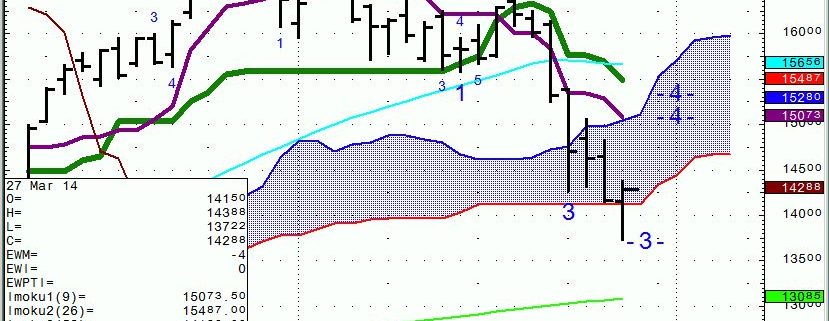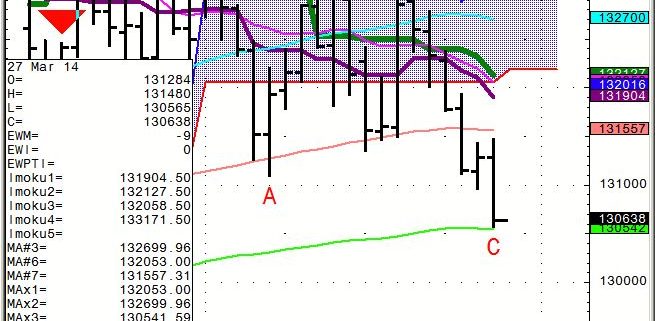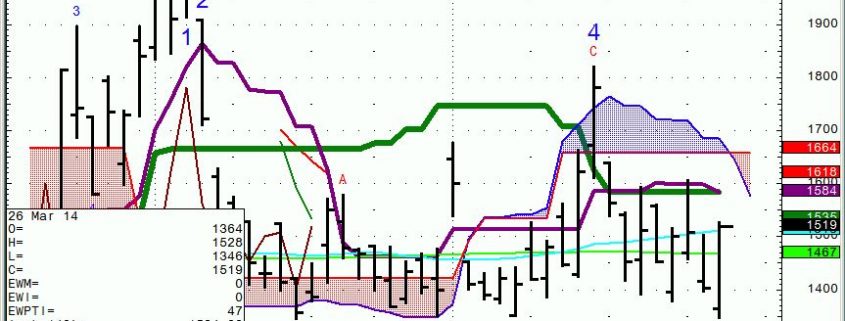While the Diary of a Mad Hedge Fund Trader focuses on investment over a one week to six-month time frame, Mad Day Trader, provided by Jim Parker, will exploit money-making opportunities over a brief ten minute to three day window. It is ideally suited for day traders, but can also be used by long-term investors to improve market timing for entry and exit points.
Global Market Comments
March 31, 2014
Fiat Lux
Featured Trade:
(LAST CHANCE TO ATTEND THE FRIDAY APRIL 4 INCLINE VILLAGE, NEVADA STRATEGY LUNCHEON)
(THE HARD NUMBERS BEHIND SELLING IN MAY),
?(SPY), (QQQ), (GOOG),
(HEDGE FUNDS: THE NEW DUMB MONEY)
SPDR S&P 500 (SPY)
PowerShares QQQ (QQQ)
Google Inc. (GOOG)
As a potentially profitable opportunity presents itself, John will send you an alert with specific trade information as to what should be bought, when to buy it, and at what price. Read more
While the Diary of a Mad Hedge Fund Trader focuses on investment over a one week to six-month time frame, Mad Day Trader, provided by Jim Parker, will exploit money-making opportunities over a brief ten minute to three day window. It is ideally suited for day traders, but can also be used by long-term investors to improve market timing for entry and exit points.
Global Market Comments
March 28, 2014
Fiat Lux
SPECIAL TESLA EDITION
Featured Trade:
(ON THE TESLA MELT UP),
(TSLA), (F), (FIATY), (PEUGY), (SCTY),
(BBRY), (HLF), (NFLX), (FSLR)
Tesla Motors, Inc. (TSLA)
Ford Motor Co. (F)
Fiat S.p.A. (FIATY)
Peugeot S.A. (PEUGY)
SolarCity Corporation (SCTY)
BlackBerry Limited (BBRY)
Herbalife Ltd. (HLF)
Netflix, Inc. (NFLX)
First Solar, Inc. (FSLR)
Tesla (TSLA) was the short squeeze that was begging to happen. Five guys owned 50% of the company, including the visionary founder, Elon Musk. Of the remaining float, 45% had been borrowed and sold short by hedge funds. All that was needed to ignite a rally was for someone to say ?Boo?.
Someone said exactly that, and their shares rocketed from $30 to $265 in little more than a year.
A poorly researched hatchet job by the New York Times on the new all electric Tesla Model S-1 produced a flood of countervailing positive reviews extolling the many virtues of the revolutionary vehicle (click ?My Take on the Tesla Tiff?). The Times could not have delivered a more effective marketing campaign if you paid them millions.
Then the company announced its first profit in history. It sold 4,900 cars, versus an expected 4,500, one of which was to me. Some 70% were of the highest margin, 80 kWh, $80,000, 300-mile range version. This was on the heels of its first ever price increase. The Q1, 2013 net jumped to $11.9 million compared to an $89.9 million loss in the earlier quarter. It boosted its forecast of this year?s total production from 20,000 to 21,000 vehicles. In 2014, this figure could hit 40,000.
There is now a one-year waiting list for the least expensive $60,000 model. Cash is pouring in so fast that Tesla announced it would pay back its $465 million Department of Energy loan five years early. It is also talking to Google about adopting its driverless technology.
South African native, Elon Musk, is said to be the model on which the Iron Man character, Tony Stark, is based. His late 2012 IPO for Solar City (SCTY) has also delivered a gangbusters performance, up 216%. Next on the calendar is taking Space X public, his heavy lift rocket company with a NASA contract potentially worth $1 billion. Since last year, his personal fortune has soared to $15 billion. This is truly the man with the golden touch.
The onslaught of good news triggered one of the sharpest and most furious short squeezes in stock market history. (TSLA) is now one of the top performing shares in the world this year, for the second year in a row. Elon did get some outside help. Squeezing the largest short open interest stocks was one of the most profitable trading strategies of 2013. Tesla simply followed on the heels of BlackBerry (BBRY), Herbalife (HLF), and Netflix (NFLX), with similar results.
There is a cautionary tale in the Tesla action. Many of the players on the short side were global warming deniers who believed the whole thing was a leftist hoax. They thought Tesla, and all the other ?green? plays, like First Solar (FSLR), were the artificial creations of government subsidy that were all going to zero once the free money was withdrawn.
After I toured the Tesla factory and saw that he car was real, I warned some of these guys they were out of their mind. Whenever one filters investment decisions through a political prism, whatever that prism is, you might as well pile up your money and set fire to it.
At $206 a share, with a market capitalization of $25 billion, Tesla is now one of the world?s largest car companies, beating out Fiat (FIATY), which owns Chrysler and Peugeot (PEUGY) and is nearly half the size of General Motors (GM). This is for a company that has only made 60,000 cars!
Tesla is now considering whether it should sue the states of Texas and New Jersey, which have banned sales of the cars. They are trying to force the company to sell through a local, good ol? boy dealer network. Tesla only sells its cars online, another ground breaking and cost cutting aspect of their business model. So much for deregulation in the Lone Star State. I guess they are trying to keep us hooked on Texas Tea.
Next year Tesla broadens out its product line to include the Model X, an all electric SUV, which should cost about the same. I am number 465 on the waiting list for that one, even though I ordered it on the first day it went on sale (everyone else ordered the car on their cell phones, while I waited to get home and do it on my Mac).
Most on Wall Street have completely missed the main point of the whole Tesla story. The real play here is for a low end mass market vehicle, which Tesla will bring out in 4-5 years, using the manufacturing expertise and technology they developed with the earlier Roadster and the S-1.
Keep in mind that electric car battery ranges are doubling about every four years. Look no further than my own garage, where I jumped from an 80 mile range Nissan Leaf to the Tesla S-1 in just two years. I just sold my starter electric car to an ecstatic PhD in biochemistry at UC Berkeley for a bargain $18,500.
That means that by 2018, you will be able to buy a 300-mile range, five passenger Tesla hatchback for about $40,000. This will enable the company to grow into a major worldwide industry presence. That?s when the ?Big Three? becomes the ?Big Four?. That?s what a $206 share price is screaming at you.
Let me explain what else is in the works. By next year, there will be 20,000 Tesla?s in the San Francisco Bay Area. Our local utility, PG&E (PGE), currently sells us power for electric cars for 5 cents a kWh between midnight and 7:00 AM. By some time in 2014, if you leave your car plugged in, it will then buy it back from you during the day at 40 cents a kWh!
With the backup supply of 20,000 1,000-pound Tesla lithium ion batteries, (PGE) might be able to take a few natural gas power plants offline (the last coal fired plant in California was closed about 10 years ago). Not only will the power for your car be free, your utility will pay you to drive it! The system is already undergoing beta testing at a utility in Delaware. Welcome to the future!
Last weekend, I drove to the local shopping mall to run some errands. There was a classic car show on, so there was no spare parking. I asked the show organizers if they were accepting late entries, just to get a parking space.
Both the fans and the other exhibitors were drawn to my S-1 like a magnet, mobbing the car and barraging me with questions. Some thought it was a joke, as there was no visible motor. I felt like Marty McFly bringing a car from Back to the Future. I popped out to run my errands. When I returned, I had won first prize and a blue ribbon.
There is one battery problem that I should write about here. Since the end of the ski season, my Toyota Highlander Hybrid has sat neglected in my driveway, accumulating pine needles and bird poop. ?Since I?m not driving it enough to recharge the conventional lead acid battery, it keeps going dead. The Auto Club has already been out to give me a jump-start three times, and they say next time, they are going to bill me.
I have written at length about Tesla since the inception of this letter five years ago. To read another recent piece with more details on the engineering and the specs, please click here ?Follow Up on Tesla?. Expect to hear a lot more.
![Cars - Classic]() The Competition
The Competition
 First Prize for a Late Entry
First Prize for a Late Entry
 I Could Have Sworn I Left the Engine There Yesterday
I Could Have Sworn I Left the Engine There Yesterday
![Cars - Electric]() In Your Future
In Your Future
While the Diary of a Mad Hedge Fund Trader focuses on investment over a one week to six-month time frame, Mad Day Trader, provided by Jim Parker, will exploit money-making opportunities over a brief ten minute to three day window. It is ideally suited for day traders, but can also be used by long-term investors to improve market timing for entry and exit points.
While the Diary of a Mad Hedge Fund Trader focuses on investment over a one week to six-month time frame, Mad Day Trader, provided by Jim Parker, will exploit money-making opportunities over a brief ten minute to three day window. It is ideally suited for day traders, but can also be used by long-term investors to improve market timing for entry and exit points.
While the Diary of a Mad Hedge Fund Trader focuses on investment over a one week to six-month time frame, Mad Day Trader, provided by Jim Parker, will exploit money-making opportunities over a brief ten minute to three day window. It is ideally suited for day traders, but can also be used by long-term investors to improve market timing for entry and exit points.
Global Market Comments
March 27, 2014
Fiat Lux
SPECIAL VOLATILITY ISSUE
Featured Trade:
(LAS VEGAS WEDNESDAY, MAY 14 GLOBAL STRAGEGY LUNCHEON),
(WILL CANDY CRUSH CRUSH THE MARKET?),
(SPY), (QQQ), (IWM), (KING), (VIX), (VXX),
(BUY FLOOD INSRANCE WITH THE (VXX), (VIX)
SPDR S&P 500 (SPY)
PowerShares QQQ (QQQ)
iShares Russell 2000 (IWM)
King Digital Entertainment Plc (KING)
VOLATILITY S&P 500 (^VIX)
iPath S&P 500 VIX ST Futures ETN (VXX)
Legal Disclaimer
There is a very high degree of risk involved in trading. Past results are not indicative of future returns. MadHedgeFundTrader.com and all individuals affiliated with this site assume no responsibilities for your trading and investment results. The indicators, strategies, columns, articles and all other features are for educational purposes only and should not be construed as investment advice. Information for futures trading observations are obtained from sources believed to be reliable, but we do not warrant its completeness or accuracy, or warrant any results from the use of the information. Your use of the trading observations is entirely at your own risk and it is your sole responsibility to evaluate the accuracy, completeness and usefulness of the information. You must assess the risk of any trade with your broker and make your own independent decisions regarding any securities mentioned herein. Affiliates of MadHedgeFundTrader.com may have a position or effect transactions in the securities described herein (or options thereon) and/or otherwise employ trading strategies that may be consistent or inconsistent with the provided strategies.










